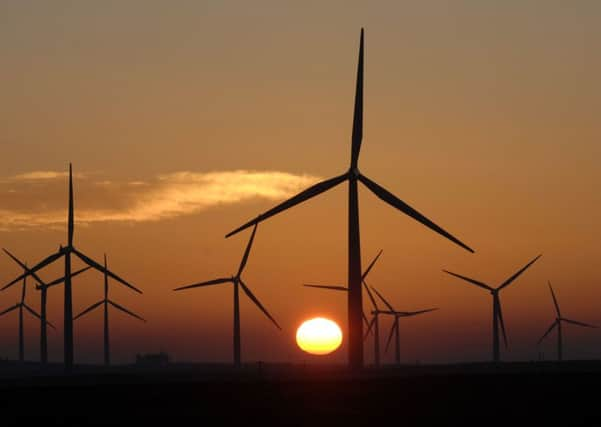Leaders: Answer may really be blowing in the wind


Even the fundamentals of the juggling act that governments are trying to achieve are not fully accepted. However, the balance of scientific opinion says that the earth is warming, and that modern man’s emissions are playing a part in that.
Warming earth and the changes that could mean to land masses and sea levels on an earth with a growing human population would be massively disruptive to put it mildly.
Advertisement
Hide AdAdvertisement
Hide AdSo it is generally accepted that we should try to do what we can to avoid that, which is why governments, including the UK government, sign up to targets for lowering emissions.
Generating energy by burning fossil fuels creates a lot of emissions, so finding new ways of generating energy are vitally important.
But the alternatives all carry a great deal of baggage. Nuclear has a good safety record and is hailed as cost-effective, but carries the potential for massive damage should safety break down, and there is also the real problem of the disposal of nuclear waste, so it may become the problem of future generations.
Power from natural sources seems more, well, natural. So solar, wind wave and tide are good areas to pursue. But the world needs an awful lot of energy and the technology needed to make the natural sources viable takes a lot of developing.
So it seems reasonable that companies are incentivised to develop the technologies that most agree are a good thing for us and the planet. Hence the need for subsidies. Some say that no subsidies are justified, and that all should exist in the free market and consumers should pay the least possible cost for their energy even if that means a much longer period of polluting and warming. Most reasonable people would agree that the greater, longer-term good, good lies in greener energy and subsidies are, quite literally, a price worth paying.
So the government moves on onshore wind subsidy are indeed perverse and downright wrong. It is wrong because it sends the wrong signal, it shows that the priority is veering away from finding alternatives to fossil fuel burning. It is wrong because it shows that climate targets are not taken seriously.
But the biggest reason it is wrong is that it will dissuade businesses from investing in energy sources. Producing energy takes a lot of investment and that investment has to be paid back over a long time. This is a long-term business, and to disrupt those plans at a political whim means that next time companies will think twice about where they put their money. And we all need those companies to be investing as much as possible in better, cleaner energy sources.
Simple solution to the rest of the world
A race crime in the deep south of America leaves nine people dead. The fact that can still happen in the 21st century should be truly disturbing. Our deepest sympathies must lie with the families and loved ones of the victims. Killings in a church, during a prayer meeting, mark this crime out and add to the horror of it.
Advertisement
Hide AdAdvertisement
Hide AdBut there are some sickeningly familiar facts. A young man is the chief suspect, and he was armed with a gun he was given as a present.
It is clear that racial tensions in the US have not gone away and in fact are runninng particularly high. The shooting took place in the Mother Emanuel church in Charleston, South Carolina. Tensions in that community were high after Walter Scott, an unarmed black man, was shot dead by a white police officer in North Charleston two months ago. That killing prompted angry protests and the officer has since been charged with murder.
Last month a CBS News/New York Times poll found that 61 per cent of Americans believe race relations in the US are at their worst in two decades. Now America is not alone in having racial tension and ethnic divides. Where it stands alone in the developed world is those racial tensions in South Carolina resulting in a death toll of nine.
What puts it out on its own are its gun laws and its cultural attitude to guns.
Barak Obama said last night: “At some point we as a country have to reckon with the fact that this type of massacre does not happen in other advanced countries”.
To other countries, the solution seems simple and straightforward.